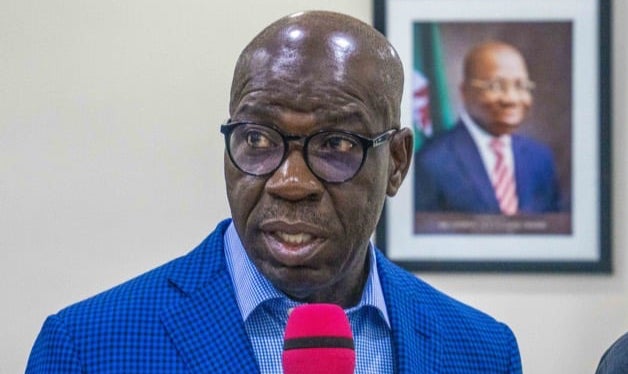Governor Godwin Obaseki of Edo State has raised serious concerns regarding the neutrality of the Peace Accord intended to foster a peaceful atmosphere during the upcoming governorship election.
He suggested that the Peoples Democratic Party (PDP) might refuse to sign the agreement due to alleged partiality exhibited by the police, whom he accused of favouring the All Progressives Congress (APC) and undermining the democratic process.
Governor Obaseki voiced his concerns during a meeting with General Abdulsalami Abubakar, Chairman of the National Peace Committee (NPC), who visited the Government House in Benin City ahead of the scheduled signing of the Peace Accord on 12th September 2024.

In a statement personally signed on 10th September, Obaseki alleged that the police, tasked with upholding the Peace Accord, had consistently demonstrated bias against the PDP since the commencement of electioneering in Edo State.
During his interaction with General Abubakar, Obaseki detailed several instances that have heightened his apprehensions about the fairness of the peace process.
He claimed that the police, under the influence of the APC, have arrested at least ten key PDP members perceived as political threats.
Among those detained was Hon. Collins Aigbogun, the serving Chairman of Esan West Local Government Area, who was reportedly apprehended and transported to the Federal Capital Territory (FCT), Abuja, bypassing the state’s jurisdiction.
Governor Obaseki explained that upon learning of Aigbogun’s arrest, he immediately contacted the Edo State Commissioner of Police, requesting that due process be observed and that the matter be managed within the state.
However, his request was ignored, a move that he says directly undermined his authority as the Chief Security Officer of the state.
Obaseki criticised the police for overstepping their bounds, and in doing so, disregarding the standard protocols expected in such situations.
Further exacerbating the issue, Obaseki revealed that the PDP leadership had lodged two separate petitions with the Inspector General of Police (IGP), highlighting the harassment and unfair targeting of PDP leaders.
Unfortunately, these petitions have reportedly gone unanswered, adding to the mounting frustration within the party.
The governor argued that these actions cast doubt on the possibility of entering a Peace Accord with an authority that has seemingly aligned itself with one of the competing parties.
Obaseki also demanded the immediate and unconditional release of the PDP chieftains who were detained in what he described as “Gestapo-style” raids by the police.
He insisted that if these leaders were indeed legally arrested, they should be charged in courts within Benin City, rather than being taken to undisclosed locations.
This, he asserted, would ensure transparency and uphold the legal rights of the accused.
Reflecting on the political landscape, Governor Obaseki drew comparisons with the 2020 governorship election in Edo State, noting the significant differences in the current political climate.
“You are very conversant with the politics of Edo State. You were here in 2020, and we had a very heated election.
You know this is an off-cycle election and there is a lot of attention. Unlike 2020, I am very worried about the developments in the state today.
The party met yesterday, and we might not likely sign this agreement.
This is the first time we are witnessing that the person who is supposed to keep and enforce the peace accord is now an active participant in creating a destructive environment,” Obaseki remarked.
Adding to the concerns, the State Chairman of the PDP, Anthony Aziegbemi, expressed unease over the strategic positioning of allies of Nyesom Wike, the former Governor of Rivers State and current Minister of the Federal Capital Territory (FCT), in key roles within Edo State’s electoral and security apparatus.
Aziegbemi pointed to the deployment of these associates as the Resident Electoral Commissioner (REC) for the Independent National Electoral Commission (INEC) in Edo State and the Edo State Commissioner of Police, raising suspicions about potential conflicts of interest and impartiality ahead of the governorship election slated for 21st September.
Obaseki’s revelations and the PDP’s reluctance to sign the Peace Accord underscore broader concerns about electoral fairness and the integrity of the democratic process in Edo State.
As the state prepares for a highly anticipated election, the allegations of bias and the challenges to maintaining peace and order will undoubtedly shape the political discourse in the coming weeks.
Governor Obaseki’s calls for fairness and transparency reflect a deep-seated desire for a level playing field where all parties can compete without undue influence from security agencies or political interference.
Support InfoStride News' Credible Journalism: Only credible journalism can guarantee a fair, accountable and transparent society, including democracy and government. It involves a lot of efforts and money. We need your support. Click here to Donate
